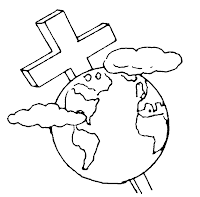
This morning I heard on the radio that Central Florida had been hit by killer storms and tornados. My first thought was of my family and friends in Orlando. I wanted to find out whether the storms had hit in the areas where they live. I wanted to know whether or not I needed to find out more about their condition and needs.
As I pondered this situation and my response to the news that I heard, I immediately thought of the following admonition from the Apostle Paul:
And let us not be weary in well doing: for in due season we shall reap, if we faint not. As we have therefore opportunity, let us do good unto all men, especially unto them who are of the household of faith. (Gal 6:9-10)
I was relieved to learn that my family and close personal friends apparently were not hit directly by these storms. Was I glad that it hit other people instead? No. I was just glad to hear that those whom I know personally were not affected. I also was glad to learn that I did not need to respond immediately.
Yes, a person feels and acknowledges an obligation to those whom God has placed in his life. Parents, siblings, spouse, children, friends, are all given by God. These associations are important. Through our loving response to one another God provides for us, even as the Fourth Petition of the Lord’s prayer teaches us.
Then, yes, our responsibilities also extend into our communities and beyond. Yet these responsibilities are not as clearly defined or pronounced as to our immediate family and neighbors and friends. The primarily responsibility toward these more distant “relations” is entrusted first to their family members.
This does not mean that we care less for others who are beyond our circle of association, for we pray for all men in all places continually. Yet in our sense of duty we recognize that God has created us with limitations that must be acknowledged. Thus we respond first to the people whom God has placed into our lives.
The apostle carries us a step farther in our understanding. He says, ” let us do good unto all men, especially unto them who are of the household of faith.” By this he teaches us that there exists for the Christian closeness that is even more important than genetics. It is the relationship that exists between those who are bound not merely by bloodlines but by the blood that endures forever. The blood of Christ, applied with the waters of Baptism, creates a union that exceeds even the familial ties that we feel in our very being. This is a bond that even death cannot break. Of all our relationships in this world, this is the most important. It is the only relationship that will never end.
 With this is included something quite wondrous. It is the sense of loving responsibility concerning those who are not of the household of faith. It is the love that God’s love for the world generates in us so that we love and pray for even our enemies. We honestly confront the world with their need for more than government help and insurance funds to rebuild after the destruction of a storm. We do all that we can for those who suffer worldly troubles, but our greater witness is that of the true communion that we share in Christ. This loving witness is more powerful than a vaccine, more powerful than a Habitat for Humanity project, more powerful than a donation to United Way or the Salvation Army.
With this is included something quite wondrous. It is the sense of loving responsibility concerning those who are not of the household of faith. It is the love that God’s love for the world generates in us so that we love and pray for even our enemies. We honestly confront the world with their need for more than government help and insurance funds to rebuild after the destruction of a storm. We do all that we can for those who suffer worldly troubles, but our greater witness is that of the true communion that we share in Christ. This loving witness is more powerful than a vaccine, more powerful than a Habitat for Humanity project, more powerful than a donation to United Way or the Salvation Army.Therefore we should never be ashamed of the love that is demonstrated first and foremost within the household of faith. After all, this is the love that moves us to look beyond ourselves, to our neighbors, to our fellow countrymen, to the world, and even to our enemies, and not to grow weary in well doing.
















No comments:
Post a Comment